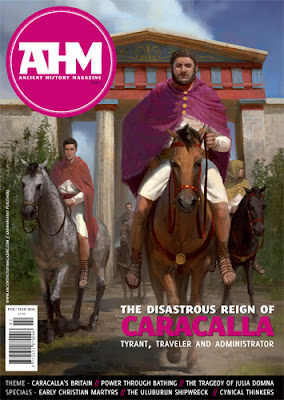23 Jan 2016
Ancient History Magazine 2, January 2016
The reign of Caracalla
The museum piece: Diana Kretschmann, "A late sixth-century gravestone from Athens - Immigrant or valued resident?"
In the last decade of the sixth century BC, a man from Naxos was buried at the most important cemetery of Athens. Visitors of the Kerameikos Museum usually overlook his gravestone, but the inscribed epitaph has a lot to tell.
Theme: Jona Lendering, "Tyrant, traveler, administrator - Caracalla"
Caracalla, who ruled the Roman Empire from 211 to 217, was a tireless traveler and a bold administrator, best known for granting citizenship to all male inhabitants. However, he was also a violent man, who ruthlessly killed anyone who might challenge his reign.
Theme: Sidney E. Dean, "Britain under Caracalla - Peace in his time"
Caracalla’s early reign is inextricably tied to Britain. He was secondin- command of his father’s 208-211 Caledonian expedition, and it was the army in Britain which proclaimed him emperor after Severus’ death. As emperor, Caracalla initiated policies which would keep Roman Britain relatively secure and peaceful for decades to come.
Theme: Jona Lendering, "Caracalla erases the past - Unperson"
After the assassination of Geta, his statues were smashed, his portraits damaged, his names and titles erased from inscriptions. Business as usual: a typical example of the Roman practice of damnatio memoriae.
Theme: Murray Dahm, "Grant, grab, process, or something else - The Constitutio Antoniniana"
The Constitutio Antoniniana or Edict of Caracalla granted Roman citizenship to all free inhabitants of the Empire in AD 212, soon after Caracalla had had his brother Geta murdered. This grant was to have an enormous impact on the inhabitants of the Empire but inexplicably passes largely unnoticed in our sources.
Theme: Christian Koepfer, "Caracalla's visit to Raetia - In search of a cure"
Although popular histories often give a different impression, the second and third years of Caracalla’s reign, 212 and 213, are not well-documented. Still, by using various types of evidence from all parts of the Empire, we can retrace Caracalla’s whereabouts and his desperate quest for a cur e.
Theme: Oliver D. Hoover, "The advice of Severus as reflected in coinage - Caracalla's coins"
Before he died, Roman Emperor Septimius Severus famously imparted his final words of wisdom to his two sons and co-emperors (Augusti), Caracalla and Geta: “Be on good terms with one another, be generous to the soldiers, and don’t care about anything else.” As his coinage shows, Caracalla listened quite well. Unfortunately.
Theme: Sadi Maréchal, "Imperial self-promotion and the baths - A palace for the people"
The Baths of Caracalla have been called one of the Seven Wonders of Rome. Even as a ruin, they are still impressive: this is the best-preserved Roman bathhouse in the Eternal City. However, there’s more to this public building than meets the eye.
Julia Domna attempts a reconciliation between her two sonsTheme: Inge Mennen, "Surviving and saving the Severan Dynasty - The love of Julia Domna"
Julia Domna was presented to the Roman people, the army, and the Senate as the mother of a new dynasty: the Severans, who promised peace and continuity after the troubled Year of the Five Emperors (193). Caracalla, however, destroyed the promise of stability.
Theme: Paul van der Heijden, "Reconstructing an emperor's facial features - A face for Caracalla"
Written sources tell us much about the emperors of Rome: the lives and influence of the rulers of the known world are well documented. Still, intriguing questions remain. What did they really look like? The portrait of Caracalla is a fascinating example.
Special: Alexander Smarius, "Roman persecution of Christians - The Scillitan martyrs"
The earliest Christian text in the Latin language is a document that records how the authority of a Roman state official was defied by six Christians under trial. Although it contains only 377 words, the document provides some important keys to understanding why Christians refused to perform pagan worship, even in face of capital punishment.
Special: Kees Alders, "The philosophical system of the cynics - Philosophical buffoons"
The conquests of Alexander the Great profoundly changed the Greek world. Persian, Babylonian, and Egyptian officials proved that the old distinction between Greeks and barbarians was obsolete. The common world view changed, and hence philosophy, as we will see in a series of articles on Hellenistic philosophy.
Special: Marc G. DeSantis, "The Uluburun shipwreck - Trove beneath the waves"
Discovered in 1982, the Uluburun wreck came to revolutionize our understanding of the world of the Late Bronze Age. It allowed an unparalleled view of what seaborne commerce was like in around 1300 BC.
Review: Piet Gerbrandy, "The big review - The Final Pagan Generation"
An extensive review of The Final Pagan Generation, which concerns society and religion during the Late Roman Empire.
How do we know: Casper Porton, "How do we know - How to pronounce Latin"
Although we don’t have any MP3 records of Cicero’s orations or Ovid’s poetry, we can reconstruct how Latin must have sounded many centuries ago. What evidence do classicists use?
Ancient History Magazine
Labels:
1 Magazines
Subscribe to:
Post Comments (Atom)

No comments:
Post a Comment